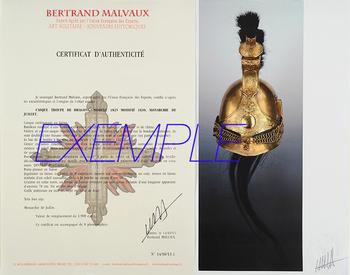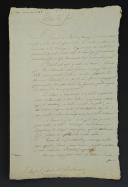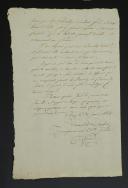
Old Guard. HANDWRITTEN ORDER SIGNED BY GENERAL COUNT LOUIS FRIANT, division general, commanding the Old Guard, ADDRESSED TO COLONEL BARON BOISSONNET, Arcy sur Aube, January 31, 1814. 18907-1
Sold out
Old Guard. MANUSCRIPT ORDER SIGNED BY GENERAL COUNT LOUIS FRIANT, divisional general, commander of the Old Guard, ADDRESSED TO COLONEL BARON BOISSONNET, Arcy sur Aube, January 31, 1814. 18907-1
... Campaign of Egypt, Auerstedt, Austerlitz, Golymin, Eylau, Eckmül, Wagram, Russian campaigns, French campaigns, Waterloo...
Entirely handwritten order given to the Imperial Old Guard by Divisional General Count Louis Friant expressing his displeasure with the soldiers' behavior and giving orders to the officers again: " ... burning, breaking, looting ... All that is left is to dismiss the officers and shoot the soldiers..."
Excerpts: Addressed to Colonel Baron Boissonnet.
" ... The General expresses his dissatisfaction to the officers for the disorders they allow the troops to commit. They have already been instructed through several orders to stop all the excesses that are committed daily, and which are becoming greater every day. The General finally wants to put an end to it; he orders patrols to be conducted immediately to restore order; officers will lead these patrols [...]
Soldiers of all arms of the Guard demand unreasonable things from their hosts; they burn, break, loot, and even go as far as chasing the inhabitants from their homes; such disorder is unworthy of the Corps, and dishonors it. The Divisional General orders that everything taken, broken, or burned must be paid for immediately by the Captain of each company, who will deduct it from his soldiers, and an account will be made to have it reimbursed.
All Battalion leaders are under arrest for four days for failing to maintain order within their Battalions [...]
Up to this day, all orders given to maintain good order have been ineffective. All that remains is to dismiss the officers who do not fulfill their duties, and to shoot the soldier; the General will be forced to use this final measure.
For four days, this order will be read at the roll call of each Company, and each Captain will be given a copy for their guidance.
Arcis, January 31, 1814.
The Divisional General Commanding the Old Guard.
Signed “Cte Friant”
2 pages. H 30 cm x 19.3 cm
Good condition, beautiful handwriting, folds marks.
BIOGRAPHIES:
Louis FRIANT, born on September 18, 1758 in Villers-Morlancourt in Somme and died on June 24, 1829 in Seraincourt, Val-d'Oise, was a French general of the Revolution and the Empire, count of the Empire and peer of France. Enlisted in the French Guards from 1781 to 1787, he joined the Paris National Guard in 1789.
[...] He was retained in the Royal Guard under the First Restoration, and Louis XVIII made him a Knight of the Order of Saint Louis on June 1, 1814. Friant, however, was one of the first to rally to Napoleon during his return. On June 2nd, Napoleon made him a peer of France. In 1815, he participated in the Battle of Waterloo at the head of the 1st Infantry Division of the Old Guard (1st and 2nd foot grenadiers) where he fought to the end with the Imperial Guard. Evacuated wounded from the battlefield, he was brought back in the Emperor's own carriage.
Louis XVIII finally retired him after twenty-three years of service. He died on June 24, 1829 in Seraincourt (hamlet of Gaillonnet), Val-d'Oise where he had restored an old priory.
André Barthélémy BOISSONNET (August 24, 1765 - Annonay, died on May 26, 1839 - Sézanne) was a French general and politician of the 19th century.
[...] Entered in March 1803, in the Consular Guard, as a battalion chief of engineers, he was in charge of accommodation with the rank of major. He was awarded the Legion of Honor officer in June 1804. Remaining within the Consular Guard which became the Imperial Guard, he participated in the campaigns of the Grand Army in 1805 (Austria), 1806 (Prussia), 1807 (Poland), and 1809 (Germany). He led the engineers in the battles of Eylau, Heilsberg, and Friedland.
Confirmed as the major of the Guard Imperial engineering with the rank of COLONEL in February 1812, he, in this capacity, took part in the Russian Campaign, attending the Battle of Borodino.
... Campaign of Egypt, Auerstedt, Austerlitz, Golymin, Eylau, Eckmül, Wagram, Russian campaigns, French campaigns, Waterloo...
Entirely handwritten order given to the Imperial Old Guard by Divisional General Count Louis Friant expressing his displeasure with the soldiers' behavior and giving orders to the officers again: " ... burning, breaking, looting ... All that is left is to dismiss the officers and shoot the soldiers..."
Excerpts: Addressed to Colonel Baron Boissonnet.
" ... The General expresses his dissatisfaction to the officers for the disorders they allow the troops to commit. They have already been instructed through several orders to stop all the excesses that are committed daily, and which are becoming greater every day. The General finally wants to put an end to it; he orders patrols to be conducted immediately to restore order; officers will lead these patrols [...]
Soldiers of all arms of the Guard demand unreasonable things from their hosts; they burn, break, loot, and even go as far as chasing the inhabitants from their homes; such disorder is unworthy of the Corps, and dishonors it. The Divisional General orders that everything taken, broken, or burned must be paid for immediately by the Captain of each company, who will deduct it from his soldiers, and an account will be made to have it reimbursed.
All Battalion leaders are under arrest for four days for failing to maintain order within their Battalions [...]
Up to this day, all orders given to maintain good order have been ineffective. All that remains is to dismiss the officers who do not fulfill their duties, and to shoot the soldier; the General will be forced to use this final measure.
For four days, this order will be read at the roll call of each Company, and each Captain will be given a copy for their guidance.
Arcis, January 31, 1814.
The Divisional General Commanding the Old Guard.
Signed “Cte Friant”
2 pages. H 30 cm x 19.3 cm
Good condition, beautiful handwriting, folds marks.
BIOGRAPHIES:
Louis FRIANT, born on September 18, 1758 in Villers-Morlancourt in Somme and died on June 24, 1829 in Seraincourt, Val-d'Oise, was a French general of the Revolution and the Empire, count of the Empire and peer of France. Enlisted in the French Guards from 1781 to 1787, he joined the Paris National Guard in 1789.
[...] He was retained in the Royal Guard under the First Restoration, and Louis XVIII made him a Knight of the Order of Saint Louis on June 1, 1814. Friant, however, was one of the first to rally to Napoleon during his return. On June 2nd, Napoleon made him a peer of France. In 1815, he participated in the Battle of Waterloo at the head of the 1st Infantry Division of the Old Guard (1st and 2nd foot grenadiers) where he fought to the end with the Imperial Guard. Evacuated wounded from the battlefield, he was brought back in the Emperor's own carriage.
Louis XVIII finally retired him after twenty-three years of service. He died on June 24, 1829 in Seraincourt (hamlet of Gaillonnet), Val-d'Oise where he had restored an old priory.
André Barthélémy BOISSONNET (August 24, 1765 - Annonay, died on May 26, 1839 - Sézanne) was a French general and politician of the 19th century.
[...] Entered in March 1803, in the Consular Guard, as a battalion chief of engineers, he was in charge of accommodation with the rank of major. He was awarded the Legion of Honor officer in June 1804. Remaining within the Consular Guard which became the Imperial Guard, he participated in the campaigns of the Grand Army in 1805 (Austria), 1806 (Prussia), 1807 (Poland), and 1809 (Germany). He led the engineers in the battles of Eylau, Heilsberg, and Friedland.
Confirmed as the major of the Guard Imperial engineering with the rank of COLONEL in February 1812, he, in this capacity, took part in the Russian Campaign, attending the Battle of Borodino.
Reference :
18907-1

Next update Friday, october 31 at 13:30 PM
FOR ALL PURCHASES, PAYMENT IN MULTIPLE CHECKS POSSIBLE
bertrand.malvaux@wanadoo.fr 06 07 75 74 63
SHIPPING COSTS
Shipping costs are calculated only once per order for one or more items, all shipments are sent via registered mail, as this is the only way to have proof of dispatch and receipt.
For parcels whose value cannot be insured by the Post, shipments are entrusted to DHL or Fedex with real value insured, the service is of high quality but the cost is higher.
RETURN POLICY
Items can be returned within 8 days of receipt. They must be returned by registered mail at the sender's expense, in their original packaging, and in their original condition.
AUTHENTICITY
The selection of items offered on this site allows me to guarantee the authenticity of each piece described here, all items offered are guaranteed to be period and authentic, unless otherwise noted or restricted in the description.
An authenticity certificate of the item including the description published on the site, the period, the sale price, accompanied by one or more color photographs is automatically provided for any item priced over 130 euros. Below this price, each certificate is charged 5 euros.
Only items sold by me are subject to an authenticity certificate, I do not provide any expert reports for items sold by third parties (colleagues or collectors).
FOR ALL PURCHASES, PAYMENT IN MULTIPLE CHECKS POSSIBLE
bertrand.malvaux@wanadoo.fr 06 07 75 74 63
An authenticity certificate of the item including the description published on the site, the period, the sale price, accompanied by one or more color photographs is automatically provided for any item priced over 130 euros. Below this price, each certificate is charged 5 euros.
Only items sold by me are subject to an authenticity certificate, I do not provide any expert reports for items sold by third parties (colleagues or collectors).

